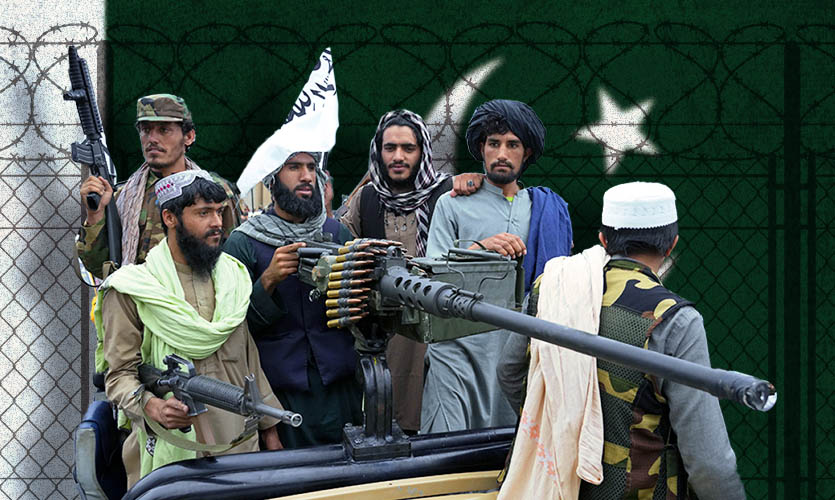Pakistan is getting a taste of its own medicine as the banned group Tehreek-e-Taliban Pakistan (TTP) is threatening the top leadership of the coalition government and inciting insurgency in the country.
On Wednesday, the Pakistan Taliban said in a statement that it will target leaders of the Pakistan Muslim League-Nawaz (PML-N) and the Pakistan People’s Party (PPP). According to Al Jazeera, Taliban spokesperson Muhammad Khorasani said in a statement that the group will target the top leadership of the ruling government, specifically naming Prime Minister Shehbaz Sharif and Foreign Minister Bilawal Bhutto Zardari.
Urging civilians to avoid going near Pakistani leaders, the TTP said that action will be taken against the ruling government and the security forces as they are “acting against the country’s interest upon wishes of the West”.
The TTP also urged the country’s religious groups to avoid taking part in the government’s action against the group. The statement comes days after the Pakistan government vowed to show “zero tolerance” against terrorism in the country, along with targeting the TTP’s hideouts in neighbouring Afghanistan.
The statement further added that Pakistan PM Sharif “tried to please America by declaring a war” against the TTP.
“Strategic Death” In Afghanistan
Pakistan and the Taliban-led Islamist government of Afghanistan are at loggerheads over the recent surge in cross-border terrorism. Afghanistan’s Taliban government made a verbal attack against Pakistan for making remarks about targets inside Kabul, allegedly on the pretext of action against the TTP.
Critics believe that the Pakistan government’s failed policy towards Afghanistan and the TTP are responsible for the resurgence of militancy in the country. The Policy Research Group (POREG) mentioned in a recent article that Pakistan’s quest to secure “strategic depth” in Afghanistan by installing a ‘friendly’ government in Kabul has resulted in what security analysts have begun to call “strategic death”.
Pakistan wanted to sideline India in Afghanistan after the Taliban overthrew the Ashraf Ghani government and seized power in Kabul, in August 2021. The two soon fell out over several differences, including a dispute over the Durand Line, which the Taliban-led Afghan government never accepted as an international border. Islamabad also blamed Afghanistan’s Taliban regime for cross-border terrorism, which resulted in a surge of terror attacks in Pakistan.
Last year in July, the killing of al-Qaeda chief Ayman al-Zawahiri in Afghanistan by the US Army also added fuel to the tension between the Taliban and the Pakistan government. The terror group believes that the Pakistan Army was behind the attack on the al-Qaeda chief in Afghanistan.
Pakistan’s Dawn newspaper writes , “It is true that the current wave of terrorism has its roots in Afghanistan but it was our flawed policy that allowed the TTP to regain its lost space in the former tribal areas.”
“Zero Tolerance For Terrorism”
Pakistan, a country that nurtured and gave shelter to several terror organisations to launch a proxy war against the Indian and Afghanistan military, used the phrase “zero tolerance for terrorism” in a recent National Security Committee (NSC) meeting chaired by PM Shehbaz Sharif, along with Pakistan Army chief General Asim Munir.
After the two-day high level meeting last week, the NSC said in a statement, “Pakistan’s security is uncompromisable and the full writ of the state will be maintained on every inch of Pakistan’s territory.”
The statement further reads that no country would be allowed to provide sanctuaries and facilitation to terrorists, and that “Pakistan reserves all rights in that respect to safeguard her people”.
Taliban Terror Returns To Pakistan
According to Al Jazeera, Pakistan witnessed more than 150 terror attacks by the TTP, killing dozens of people and security forces. Khyber Pakhtunkhwa, the northwestern region of the country, saw a 108 percent rise in terror attacks in 2022. Last month, in December, at least 40 Pakistan security personnel were killed in the TTP’s deadliest terror attacks.
According to the Indian Express, Pakistan saw a sharp increase in terror attacks led by the TTP after Islamabad appointed General Asim Munir as the army chief. Following the latest developments in the top leadership of the Pakistan Army, the TTP announced the end of the ceasefire with the government and called for nationwide attacks.
The Pakistan Taliban says that it wants imposition of its hardline interpretation of Islamic law, and a reversal of the merger of Pakistan’s tribal areas with the northwestern Khyber Pakhtunkhwa province.
Afghanistan Warns Pakistan
Amid a huge rift between the Afghan Taliban administration and the Pakistan government, Kabul has categorically said Islamabad should avoid ‘provocative ideas’.
The Afghan Taliban recently mocked the Pakistan Army while sharing a photo of the 1971 India-Pakistan war in which Islamabad surrendered before the Indian Army, resulting in the formation of Bangladesh.
The statement was in response to Pakistani Interior Minister Rana Sanaullah who called for a war against the TTP’s activities and hideouts in Afghanistan.
Earlier on Monday, Pakistan’s Defence Minister Khawaja Muhammad Asif claimed that Afghanistan’s soil is being used by militant groups to launch attacks on his country, evoking a sharp response from the Taliban government in Kabul.










